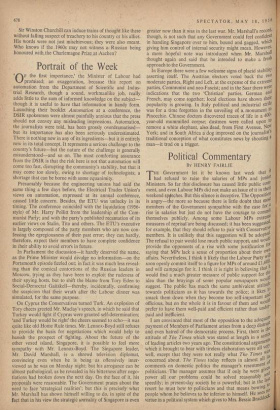Portrait of the Week
inF the first importance,' the Minister of Labour had proinised; an exaggeration, because this report on automation from the Department of Scientific and Indus- trial Research, though a sound, workmanlike job, really adds little to the sum of informed knowledge on the subject— though it is useful to have that information in handy form. Launching their booklet Automation at a conference, the DSIR spokesmen were almost painfully anxious that the press should not convey any misleading impressions. Automation, the journalists were told, has been grossly overdramatised- but its importance has also been seriously underestimated. There is nothing new in any of its ingredients—but it is entirely new in its total concept. It represents a serious challenge to the country's future—but the nature of the challenge is generally misunderstood—and so on. The most comforting assurance from the DSIR is that the risk here is not that automation will come too fast, disrupting the community's stability, but that it may come too slowly, owing to shortage of technologists; a shortage that can be borne with some equanimity.
Presumably because the engineering unions had said the same thing a few days before, the Electrical Trades Union's views on automation, expressed at its annual conference, caused little concern. Besides, the ETU was unlucky in its timing. The conference coincided with the liquidation (1956- style) of Mr. Harry Pollitt from the leadership of the Com- munist Pariy; and with the party's published recantation of its earlier views on Stalin, Tito and others. The ETU's executive is largely composed of the party members who are now con- fessing the egregiousness of their past error; they can hardly, therefore, expect their members to have complete confidence in their ability to avoid errors in future.
In Parliament the discussion—it hardly deserved the name, as the Prime Minister would divulge no information—on the Portsmouth episode fizzled out; in fact it was much less reveal- ing than the comical contortions of the Russian leaders in Moscow, trying as they have been to exploit the rudeness of their spying hosts, but to shift the blame from Tory Eden to Social-Democrat Gaitskell—thereby, incidentally, confirming the suspicion that their wrath after the Labour dinner was simulated, for the same purpose.
On Cyprus the Conservatives turned Turk. An explosion of Tory cheers greeted Mr. Maclay's speech, in which he said that Turkey would fight if Cyprus were granted self-determination; 'and Turkey would be right' the cheers seemed to echo—it was quite like old Home Rule times. Mr. Lennox-Boyd still refuses to provide the basis for negotiations which would help to banish the prospect of fighting. About the future of the other vexed island, Singapore, it is possible to feel more sympathy with Mr. Lennox-Boyd. The Singapore leader, Mr. David Marshall, is a shrewd television diplomat, convincing even when he is. being as offensively inter- viewed as he was on Monday night; but his arrogance can be almost pathological, as he revealed in his bitterness after nego- tiations had broken down the next day. On the face of it, his proposals were reasonable, The Government prates about the need to face 'strategical realities'; but this is precisely what Mr. Marshall has shown himself willing to do, in spite of the fact that in his view the strategic unreality of Singapore is even greater now than it was in the last war. Mr. Marshall's record, though, is not such that any Government could feel confident in handing Singapore over to him, bound and gagged, which giving him control of internal security might mean. However, a more hopeful note was introduced when Mr. Marshall thought again and said that he intended to make a fresh approach to the Government In Europe there were a few welcome signs of placid stabilitY asserting itself. The Austrian electors voted back the two moderate parties, Right and Left, at the expense of the extreme parties, Communist and neo-Fascist; and in the Saar there were indications that the two `Christian' parties, German and French, may come together; local elections have shown their popularity is growing. In Italy political and industrial strife was for a time forgotten in the unveiling of a monument to Pinocchio. Chinese doctors discovered traces of life in a 400.
year-old mummified corpse; dustmen were called upon to remove a white elephant, also.dead, from First Avenue, New York; and in South Africa a dog improved on the journalises traditional conception of what constitutes news by shooting a man—it trod on a trigger.


































 Previous page
Previous page